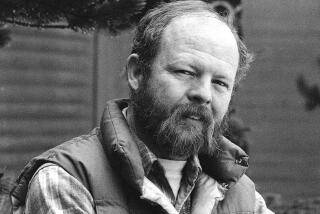2 Do-Gooders Go Nuts Over Amazon
- Share via
MILL VALLEY, Calif. — The last few months have been enlightening for Sat Santokh Singh Khalsa.
After nearly three decades of peace, civil rights and environmental activism, Khalsa--an ex-New Yorker who sports the flowing beard and white turban of a Sikh--is finding out that it’s possible to actually make some money while trying to save the Earth. With four children in college, he said, the timing couldn’t be better.
Khalsa, 52, and his partner, Steve Bogoff, run Rainforest Products Inc., a year-old venture that markets cereal and granola made with nuts plucked from the dwindling Amazonian rain forest. The idea is to create a market that makes the trees too valuable to chop down.
Bogoff even has a ready answer for anyone accusing them of exploiting the rain forest for profit: “If we’re not financially successful, we can’t do any good for anybody. We’ve got to have a profitable company, or we’re not in business.”
If Central Casting had gone looking for two guys to head a fictitious, stereotypically Californian, do-good company, they couldn’t have done better.
Bogoff, 49, also a bearded former New Yorker, was formerly chief financial officer for Esalen Institute, the human potential mecca in Big Sur. As Rainforest Products’ chief executive, he operates from a bedroom office in his compact, hillside home in woodsy Mill Valley, an affluent enclave of professionals and aging rock stars north of San Francisco in Marin County.
Khalsa’s resume sums up several decades of movements. In the ‘60s, he did stints as executive director of the War Resisters League, as manager of the Grateful Dead and as leader of a rural community in Lake County, Calif. In the early ‘70s, he converted to Sikhism, and five years ago, he founded Creating Our Future, a nonprofit organization in Berkeley that holds workshops for young people interested in environmental activism.
In 1988, Khalsa organized a Grateful Dead rain forest benefit at Madison Square Garden, where he introduced his friend Ben Cohen, of Ben & Jerry’s ice cream fame, to Jason Clay, a Harvard-based anthropologist who heads Cultural Survival, a nonprofit human rights organization dedicated to helping indigenous peoples.
That meeting gave rise to Rainforest Crunch, a popular and profitable brittle that uses nuts from the rain forest and is sold by Community Products, a Ben & Jerry’s affiliate in Vermont.
At Creating Our Future’s summer camp the next year, where Cohen and Clay were discussing what to put on the Rainforest Crunch package, Khalsa made an offhand remark that the way to reach even more people would be to put rain forest information on cereal boxes. “Everybody reads those,” he said.
Khalsa knew of an Oregon bakery that could make and package cereal, and Grateful Dead guitarist and singer Bob Weir and spiritual leader Ram Dass provided part of the company’s $100,000 in seed money. Rainforest Products was on its way.
Rainforest Crisp cereal and Rainforest Granola are now featured in natural food stores nationwide. The Crisp is also available in select supermarkets from Northern California to the Mid-Atlantic. At $2.59 to $3.59 for a 13.5-ounce box, the stuff is not cheap (rain forest nuts represent only 8% of the cereal by weight and 25% of its cost), but Bogoff said consumers like the idea of helping a good cause just by eating breakfast.
Sales by the company, which shipped its first product last April, are running at an annual rate of $700,000, and Khalsa expects it to turn a profit in the next few months. So far, he and Bogoff are making a “comfortable” living, but, as Bogoff acknowledged, “I guess it’d be nice to make a killing.”
Like its Vermont predecessor, Rainforest Products buys nuts through Cultural Survival, paying a 5% premium that goes back to the rain forest residents. It also promises 7% of its profits to Creating Our Future, Cultural Survival and Rainforest Action Network, a nonprofit group in San Francisco.
Clay estimated that 120 companies are now making food products and cosmetics containing rain forest commodities; one-third of them work with Cultural Survival. For its part, Rainforest Products is working on a new flake cereal and a granola bar, plus another round of financing from socially minded venture capitalists, and maybe, who knows? Bogoff added, the company might even go public.
Can the Fortune 500 be far behind?
More to Read
Inside the business of entertainment
The Wide Shot brings you news, analysis and insights on everything from streaming wars to production — and what it all means for the future.
You may occasionally receive promotional content from the Los Angeles Times.










